- Home
- Alice McDermott
Someone Page 5
Someone Read online
Page 5
“Come see Durna,” Gerty said.
We went around the polished dining-room suite and into her parents’ bedroom, where I had been before only to say the Rosary. It was filled with a curtain-diffused light. There was a white bassinet at the foot of the bed. The wallpaper was a close and crowded design of roses and green vines, and there were embroidered roses scattered across the bedspread. There was a tall brown dresser against one wall, Mr. Hanson’s doorman’s cap on top of it and, between the two windows, a dressing table with perfume bottles and jars of cream and a silver-backed brush still threaded with Mrs. Hanson’s black hair. The windows here were opened behind the curtains, and sunlight, as well as the metallic odor of sunlit air, filled the room. There was the sound of cars, of people passing by in the street. Gerty took my hand. Together we approached the little bed and peered in. The baby was fair-haired, only a hint of gold across her crown, and red-cheeked, with plump fingers and a mouth like two tiny rose petals, lips the color of a pink rose.
The baby startled awake when I bumped the bassinet, and her eyes were deep blue, instantly serene. Lashes pale as wheat. She waved her arms. Her wrists and her little hands were fat and dimpled. And then a toothless smile, all for me, I thought, although Gerty, newly minted expert, whispered that it was only gas. There was sunlight pouring into the room. The windows were wide open, but there was no breeze, only the sounds of cars and carts and of some children in the street. When the baby began to fuss, Gerty reached into the bassinet and lifted her, the blanket trailing. She held her on her shoulder, ran her fingertips up and down her spine, as adept as any adult. And then Gerty scooted the quieted child into the crook of her arm. She put her lips to the pretty forehead.
I felt such a rush of envy then—to be Gerty, to have such a lovely baby in my own care—that I shivered with the thought, well knowing that I had walked upon my mother’s grave.
From the kitchen came the sound of a teakettle whistling and, behind it, the rattle of baby bottles clinking in a pot of boiling water. I could hear the lady in the kitchen muttering to herself, shutting the icebox, slamming the oven door. I caught the first scent of baking bread.
Mrs. Hanson would never again be found in these rooms. Or seen waiting for Gerty outside the fence at school. Or met at the grocery, or in the crowds after Mass. Her comb and brush were here, the crystal bottles of her perfume, her children and her husband were here, this lovely baby, but she had vanished forever. And although the day would come when Gerty, sitting beside me on our stoop, would suddenly bow her head to her knees and weep without sound or explanation for what seemed the better part of an hour, at that moment, in the pretty room, with the lovely baby in Gerty’s arms, I believed only that the bright, bustling world had simply closed itself up over Mrs. Hanson’s disappearance, and that this, then, was the way of all sorrow—Gerty’s and the Chehabs’ and perhaps even Dora Ryan’s, once she found someone else—closed up, forgotten, vanished in the wink of an eye.
In her own last days, my mother asked, on waking, “Am I home?” Because she didn’t want to be in Ireland, but in her last days every good bit of sleep she managed to get seemed to return her to that dreaded shore. “Am I home?” she would ask, tears standing in her rheumy eyes.
In the first days of her last illness we said, “Yes,” Gabe and I and Gabe’s friend Agnes, who was helping out—even the visiting nurses who stopped by—but when we saw how this distressed her, how she plucked at the sheet and turned her head away, we began to understand and we amended our reply. “No,” we said, to reassure her. “Not home. Here. In Brooklyn.”
Once, she said, “Show me.”
I had already drawn back the bedroom curtain and raised the shade. Now, with one knee on the window seat, I struggled to open the old window in the overpainted frame. I banged at it with the heel of my palm, cursing under my breath, until my brother, who was sitting in the dining-room chair he had drawn up to the side of the bed, looked up impatiently to ask if I’d like some help.
I pushed the window open, the sound of the street, the odor of the street, suddenly, almost visibly, slipping into the room, climbing the walls, crossing the ceiling, and drifting down across the bed. The odor of car exhaust and heated asphalt, of garbage and incinerator fires. “There,” I said. “Smells like Brooklyn.”
There was an argument going on out in the street, voices of children mostly, cursing and shouting, tinny music from a radio somewhere. “Sounds like Brooklyn, too,” I said, and saw Gabe glance at me from across our mother’s bed.
The neighborhood was in decline, the building itself much neglected. Gabe and my mother now slept with lights on in all the rooms, just to keep the roaches at bay. I had it from Agnes that when the parlor-floor apartment was broken into and ransacked—drugs were involved—one of the cops who came to the door asked my brother why he was still here, why he didn’t take my mother to a better neighborhood. To Jersey or Long Island.
Gabe explained that our mother had raised her family here. That she had come here as a young bride. She’d mourn for the place, he said, should she leave it now.
“She’ll get over it,” the cop said.
Gabe told him, “My father spent his last days in these rooms,” and the cop looked around sympathetically, but raised his eyebrows in that wry, Come on, be realistic way of New Yorkers. “I doubt he’s coming back,” he said kindly.
Later, when Gabe was held up on the street by three thin teenagers, “youngsters,” he’d called them, he asked me over the phone, “What’s happened to so harden the children’s hearts?”
I shouldn’t have, but I laughed out loud. “Look where you’re living,” I said.
“There you are,” I told my mother, standing in the hot breeze that had entered along with the rattle of traffic and the voices in the street. “Brooklyn.”
My mother turned to Gabe, who was holding her hand. “Show me,” she said again.
The strain of this vigil was evident in the shape of his shoulders and the weariness in his eyes. He glanced up at me where I stood by the window and then down at her again. “All right,” he said softly. He got up slowly, pushing back the old dining-room chair. He leaned over the bed, slipping his hands beneath her. I watched in some astonishment as he lifted her, the bedclothes trailing.
“Get the door,” he said over his shoulder as he made his way out of the room with our mother in his arms like a child. He turned to his side to fit them both through the passageway, and I overtook them in the living room. We had lined the woodwork here with boric acid, to keep the roaches at bay, and there was something of its pale dust over everything in those days. It sometimes made me recall: sand of Syria and Mount Lebanon.
I went ahead to open the door. Gabe slipped through it, our mother in his arms. I followed them down the stairs, astonished, full of objections, but unable to object. I watched him as he gently negotiated the turnings. I wondered briefly if he planned to carry her all the way to the hospital. In the vestibule, the door to the parlor-floor apartment was still patched with plywood. Gabe turned to me and nodded toward the street. My mother’s eyes were closed. In my brother’s arms she seemed as small and light as an infant. I went ahead to pull the first door open, and then slipped around them to get the outer door as well. There was a blast of heat. Gabe carried my mother into the sunlight and down the steps. There were kids on the stoop across the street, there was the tinny music from their transistor radios. They glared, open-mouthed. A pair of dark men passing by looked up as Gabe came down the stairs with my mother in his arms. They walked to the curb, glancing over their shoulders, giving him wide berth. Gabe, too, went to the curb and then turned around to look back up at the house. I rushed to scoop up the sheet and the blanket that was now brushing the sidewalk.
“You’re here, Momma,” I heard him say. “Where we’ve always lived.”
My mother raised her head. She extricated one thin hand from the winding bedclothes and raised it to her eyes against the sun. She looked down the street
and then up at our building, the blue summer light reflecting in the glass of the front door, the bowed parlor window—some plywood there, too—and then up to the fourth floor, where a bit of lace curtain, her handiwork, had been drawn through the opened window.
“Not home,” I heard Gabe tell her, reassuring her. “Brooklyn.”
My mother called me into the kitchen. Gabe was at the seminary out on Long Island by then, a beautiful place that was reached at the end of a long train ride. There were tall trees there and sloping lawns, and the young men walked in and out of the shadows of the leaves with their heads bent, their prayer books held gently between their hands, like little boys with caterpillars cupped in their palms.
“It is time,” my mother said, “that you learned a few things.”
On the narrow, corrugated tin of the drain board beside the sink, there was the flour bin and a bottle of buttermilk, the pale box of baking soda, a box of raisins, a box of salt, and a tin of caraway seeds. On the small table beneath the window, a bowl and a spoon and the measuring cup. There was as well a narrow card on which she had written in her careful hand the recipe for soda bread.
It was time, my mother said, that I learned a few things about cooking.
I stood in the kitchen doorway, all reluctance. Why? I wanted to ask.
My mother tied an apron around my waist. “All right,” she said. She nodded toward the table, the bowl and the spoon and the recipe card. I looked at her. The morning sunlight through the single window lit the down on her cheeks. It showed her brown eyes had some green in them, too. And that on either side of her tall forehead her dark hair was turning gray.
“Go ahead,” my mother said. “Get started.” And when she saw me hesitate, she impatiently put her hand on my shoulder and turned me toward the table and the bowl and the spoon. “Read the recipe over and then gather your ingredients,” she said slowly. “They’re all right here. I’ll supervise.”
I looked at my mother in her housedress and her apron trimmed with green rickrack, her wide soft breasts and her pillowed belly and her strong, firm hands. A body, a physical presence, more familiar to me in those days than my own, since my own was something I had only begun to consider.
“Don’t be dense, Marie,” my mother said. “Don’t stand there gawking at me like I’m speaking Chinese. Go.” And another touch on the shoulder. “Read the recipe over once and gather your ingredients. It isn’t hard. It’s high time you learned.”
Why? was what I wanted to say, but I was certain without conscious thought that the question would get me into trouble. I turned reluctantly to the table, my feet feeling heavy in my shoes. I picked up the card. It was my mother’s routine to make her soda bread on a Saturday morning while I went out to join my friends. It had always been so.
“Read it over,” my mother said. And I nodded, pretending to. The sun through the single window was bright in my eyes.
“Now gather what you need.”
I picked up the flour bin and brought it to the table. I picked up the buttermilk and the raisins. I went back for the salt and the tin of caraway seeds and then stood before the bowl and the spoon and the measuring cup. Beyond the window, beyond the gray bars of the fire escape, the wash my mother had done this morning was waving on the line: sheets and pillow slips, my school blouses and my father’s shirts, which were hung upside down by their hems, their arms waving in a way that made me grow dizzy in sympathy.
“Haven’t you forgotten something?” my mother said behind me. I looked at the ingredients I had lined up on the small table. The sun had turned the buttermilk a kind of blue. “No,” I said.
My mother took me by the shoulders and turned me around. “Are you sleepwalking?” she said. “There’s the baking soda. You’ll have nothing at all if you don’t have that.”
I fetched the box of baking soda and then once more stood before the table. “Now what?” my mother asked.
I shrugged. Beyond the waving clothesline were the windows and fire escapes of our neighbors, the dancing laundry of a dozen more families, the tall brown poles that held the lines, electric lines and clotheslines.
“Glory be to God,” my mother said. “Now you read the recipe, Marie.”
I looked down at the little card. The ink my mother had used was brown. Her handwriting was lovely and neat, the capital S and the capital B at the top of the card were striking—perfectly shaped, perfectly proportioned. My mother had learned from Irish nuns. “Marie?” my mother said.
The sound of her voice was more familiar to me then than my own; I knew the end of my mother’s patience when I heard it.
“You tell me,” I said softly. “You tell me what to do.”
Behind me, I heard my mother cross her arms over the rickracked apron.
“There’s a recipe in front of you,” she said. “And unless I’m very much mistaken you know how to read. Read it.”
I lowered my head the way I’d seen horses do, and dogs, when they didn’t want to be led. “You tell me,” I said again.
I heard her stamp her foot. “I won’t.” Anger always stirred my mother’s brogue, like meat brought up from the bottom of a stew. “I wrote it out for you so you could read it. Now read it.”
I didn’t turn around. “Just tell me,” I said.
“A recipe is meant to be read,” my mother said.
I dipped my head again. “I’d rather you just tell me.”
In the silence that followed, I could hear, faintly, the noise from the street, where I wanted to be: cars passing and children calling. There was also the distant thump of doors closing in the apartments below, various footsteps on the stair. There was the whine of someone’s clothesline pulley. The chuckling warble of some pigeons at the window.
“Measure out your flour,” my mother said slowly, relenting. I shifted my feet a bit to accommodate my triumph: better than risking a sly smile.
I put my hand on the measuring cup. “How much?” I said.
And now, even without turning around, I knew it was my mother who was smiling. “You’ll have to read the recipe to find out,” she said. “Won’t you?”
It was a wonder, my mother said later, in every retelling of it, that we didn’t kill each other on that bright morning. Slowly, through a series of niggling concessions on both our parts—some telling, some reading, some turning away in anger, and some giving in—the ingredients were placed into the bowl and the bread was shaped and lifted into the black frying pan. When my mother brushed past me to mark the cross in its surface, her hands were trembling with anger.
“I don’t know what’s gotten into you,” my mother said, and banged the pan on the top of the stove, then banged it into the hot oven. “You are the most stubborn child.”
She put away the ingredients, slamming cabinet doors, and washed the bowl and the spoon in the sink.
She turned to me again. The sunlight caught the green in my mother’s narrowed eyes, as if she were peering into a deep green wood. “The strangest child I’ve ever heard of,” she said. “Refusing to read a simple recipe.”
She dried the bowl and put it away. She dried the spoon. She said, “Can you at least, at least, keep an eye on the clock and take this out in forty minutes? I’ve got to meet your father downtown. Can you be responsible for that much?”
I said yes, but my eyes went to the sunlight at the window.
My mother took my chin and made me turn to the clock on the stove top.
“When the big hand comes around to the twelve,” she said, “take the bread out. Use the cloth. Can you do that? When the big hand comes around to the twelve.”
“I can tell time,” I said sullenly, risking her anger once more.
Once again my mother studied my face, as if it were lost in a thicket of trees. “And you can read, too,” she said, measuring out her words. “But today it seems it’s not a question of can, is it? It’s a question of will. Will you do it is what I’m asking.”
I turned my face to the light at the w
indow. I pulled off my glasses. I was a bold piece—I could hear my mother’s accusation even before she said it. “All right,” I said, and then collapsed into the single chair beside the table. “I will,” I said, and crossed my arms over my chest, turning my exaggerated gaze to the small clock on the stove, its old glass fogged, its numbers and its two hands mere slashes of black. “Here I am,” I said, all impertinence. “I’m watching the time.” Knowing my mother’s voice as well as I did, I could already hear her say, “Oh, you are a bold piece.” Knowing the limits of my mother’s patience, I could already feel the slap on my cheek.
But my mother merely stood beside me with her hands on her hips, studying her stubborn daughter once more, even as that daughter kept her exaggerated, myopic stare on the clock. “I suppose this is how it’s going to be,” she said softly, more to herself than to me. “You’re growing up.” And then, for a moment, she put a gentle hand to my head.
She said, “God help us both,” and left the kitchen.
I kept my eyes on the small face of the clock until my mother came back in her hat and coat, her purse held over her arm. “Thirty minutes more,” she warned, and I withdrew the question I was going to ask, “Where downtown?” in order to sigh impatiently instead. “Yes, Momma.” I heard her close the apartment door. I put my glasses back on and let my gaze wander around the solid world, to the stove top with its black burners, to the blank white enamel face of the oven door. To the sink and the drain board beside it. The tile wall and the narrow shelf above, where there was a yellow matchbox and a small statue of the Blessed Mother in her blue cloak. To the table at my elbow and a faint crescent moon of spilled baking soda that marked where the bowl had been, to the window and the light and the clothes on the line. The sunlight had already moved past fresh morning and into the steady weight of the rest of the day.
I looked around. I wanted to leave the kitchen, of course, to leave the apartment and call on my friends, which was, until this morning, my usual Saturday routine, but I resisted it. I stared at the clock once more. What I needed was a book or the newspaper, I thought. I imagined my mother coming home to find me sitting here, with the newspaper spread before me and the perfectly golden bread cooling by the window, confounding all her expectations. There would be some satisfaction in that.

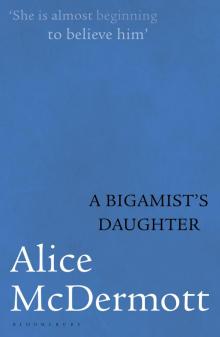 A Bigamist's Daughter
A Bigamist's Daughter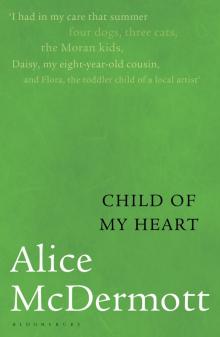 Child of My Heart
Child of My Heart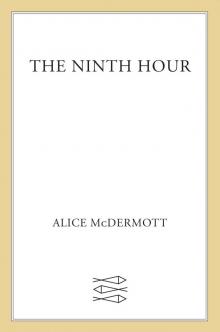 The Ninth Hour
The Ninth Hour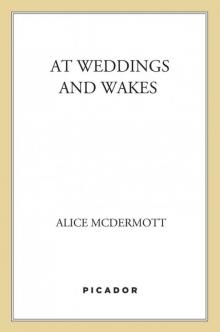 At Weddings and Wakes
At Weddings and Wakes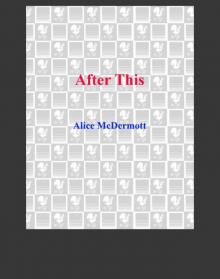 After This
After This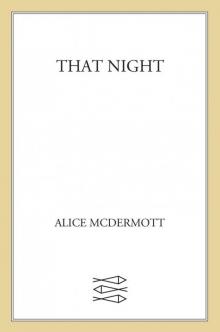 That Night
That Night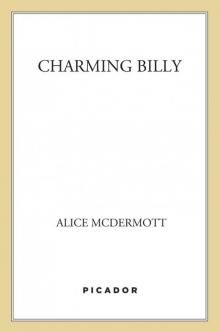 Charming Billy
Charming Billy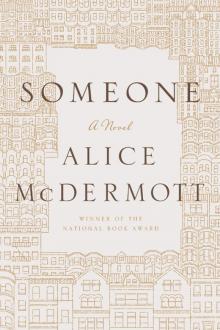 Someone
Someone